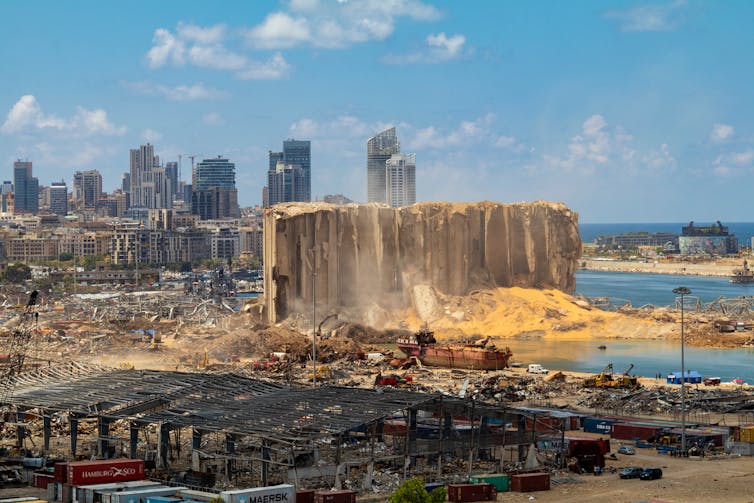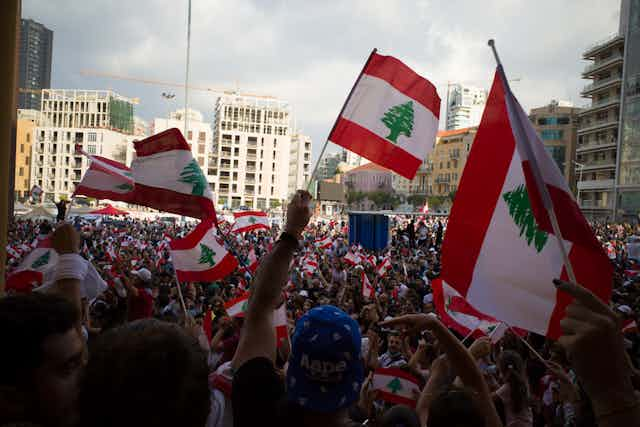The recent return of violence to Lebanon derails hope that the worst of the crises that have plagued the country over the past four years have been left behind.
After a spiral of hyperinflation, debt default and crumbling public services, modest signs of economic recovery from one of the “most severe crisis episodes [seen] globally since the mid-19th century” was predicted for 2024. But this glimmer of optimism has waned as Lebanon risks being dragged into war with Israel.
On January 2, Israel assassinated senior Hamas political officer Saleh al-Arouri in south Beirut after daily rounds of Israeli shelling in southern Lebanon.
The conflict has already resulted in the displacement of more than 75,000 citizens within Lebanon, as well as the deaths of 25 more. The Gaza conflict also prompted the cancellation of “more than half of travel reservations to Lebanon” during the winter holidays. The shock to tourism spending will quickly reverse the limp economic growth that was projected for 2023.
The mood in Lebanon over Christmas was one of deep concern at the prospect of conflict. Any spillover of conflict in the country would cause further internal displacement and stretch state services beyond their breaking point.
The last conflict between Israel and Lebanon – in 2006 – resulted in an estimated US$6.75 billion (£5.3 billion) worth of damages and lost revenue and thousands dead or displaced from their homes.
A repeat of the 2006 Lebanon war would cause a humanitarian disaster and worsen the state of Lebanon’s already beleaguered economy. Notably, a new conflict would probably force thousands of those living in Lebanon to flee the country, adding to an already existent trend in outward migration, a fact not lost on nearby Mediterranean states.

Prelude to war?
Backed by Iran, the Lebanese militant Hezbollah movement sees itself as a resistor against Israel. Hezbollah holds an estimated 130,000 rockets and missiles ready for any conflict with Israel.
But, despite this antagonistic stance, the group’s secretary general, Hassan Nasrallah, was restrained in his rhetoric, a hopeful sign that he is seeking to avoid war.
In the direct aftermath of the assassination of al-Arouri in Beirut, Nasrallah discussed the opportunity to “liberate” all of Lebanese territory through talks and halt Israel’s use of Lebanese airspace and land to launch attacks into Syria. There is precedent for such talks. In 2022, US-mediated negotiations between Lebanon and Israel established clear boundaries within which both states could explore for natural gas.
Nasrallah’s coded message seems to have been heard by the US. On January 11, senior US energy advisor Amos Hochstein landed in Beirut to discuss how to reduce tension between the two countries.
While the overtures might appear positive, the Lebanese public are aware of the precarious situation ahead. Nasrallah is walking a tightrope between keeping Lebanon out of conflict it cannot afford while trying to ensure that Hezbollah keeps its credibility as the “resistance” to Israel.
The fear in the streets of Lebanon is that this is an impossible path to negotiate and eventually Hezbollah will be sparked into further action, escalating the conflict. Reports that Israel assassinated two Hezbollah commanders in southern Lebanon on January 14 only add to the pressure on Hezbollah to respond.
Why Lebanon is so fragile
Several overlapping crises over the past decade have already conspired to bring Lebanon to the point of collapse. The civil war in neighbouring Syria since 2011 has seen an estimated 1.5 million refugees seek shelter in Lebanon. The country hosts the largest number of refugees per capita and per square kilometre in the world.
Lebanon has also been facing a severe economic crisis since 2019, which was worsened by the onset of the COVID pandemic. As a result of this crisis, approximately 80% of Lebanese now live in poverty and 36% below the extreme poverty line.
This crisis was worsened in 2020 following the Beirut port explosion, which killed 218 people and devastated parts of the country’s capital. The explosion rendered half of Beirut’s healthcare centres nonfunctional, impacted 56% of private businesses in the city, and caused up to US$4.6 billion in material damage.

Lebanon’s precarious situation is exacerbated by its power-sharing government – which is mired in corruption – and dysfunctional institutions. Lebanon is ranked 150 out of 180 countries for corruption, the government has failed to pass a budget in over a decade, and credible allegations of vote buying and political interference in elections have been recorded.
Lebanese citizens who have borne the brunt of these crises have directed their anger at the government. In October 2019, as the economic collapse unfolded, an estimated 2 million people took to the streets to demand the government’s resignation.
Survey evidence also points to rapidly declining levels of trust in the state’s government and leaders. Only 8% of Lebanese citizens say they have a great deal or quite a lot of trust in the government.
This is significantly lower than in other Middle Eastern countries surveyed. In Iraq, where citizens have the next lowest level of trust in their government, a much higher proportion (26%) say they have a great deal or quite a lot of trust in the government.
Ceasefire essential
In light of Lebanon’s fragility, the prospect of a war between Israel and Lebanon needs to be avoided at all costs. And an immediate ceasefire in Gaza is needed.
Beyond this, a potential framework for an agreement between Israel and Hezbollah is already available. UN Security Council resolution 1701 stipulates that Israel respects Lebanese sovereignty and requires UN peacekeeping forces to be deployed on the border.
Robust international mediation and pressure is urgently needed to enforce the agreement to prevent a humanitarian disaster.

